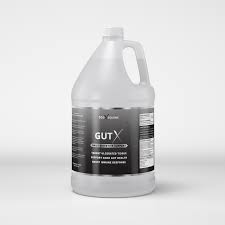Gut X Product Review

When you drop onto this company’s landing page the first thing you are hit with is a huge banner announcing their great sale price.
The next line is “The Gastric Support Supplement that Prevents & Relieves Ulcers in Horses.”
This is where the problem I have with this supplement begins because there isn’t a shred of evidence that this particular product as well as the ingredients in this product meets either of those claims.
The product and the company are completely defrauding owners by making these claims and are clearly violating FDA regulations by crossing the line into making claims that are reserved for drugs that have been approved by the FDA.
Supplements can’t prevent or treat any condition, this is reserved for drugs. 100X does not state that their product treats ulcers, instead the verb chosen is “relieves”. I’m not sure people turning to this supplement are catching this subtlety.
There is only one omeprazole compounding that has FDA approval for the treatment of EGUS and that is Gastroguard. Until the FDA approves a novel drug therapy for EGUS nothing else can claim it works.
For any of you reading this who feel as though drug testing and approval is expensive please consider this; If a company had a treatment that would compete with Gastroguard in efficacy and cost that company would immediately see a huge profit in their investment since right now BI has the lock with Gastroguard.
I found something else very interesting about their website. There are customer reviews and testimonials but absolutely no research cited to back up their claims. On the website.
Their Facebook ads, however, are a much different story.
A Dangerous Implication
One of their ads headlines with “Omeprazole Shows a Frightening 23% Chance of Acid Rebound in Horses!”
This implication is dangerous because it may cause a horse owner to avoid a proven and effective treatment for their horse, replacing it with something that has no proof that the product is an effective solution.
The citation they sent me to support this claim was an opinion authored by Dr. B.W. Sykes in 2015. This article published in Journal of Internal Veterinary Medicine extensively summarizes the treatment protocols for EGUS. Dr. Sykes is considered the world’s leading authority in the study and treatment of Equine Gut Ulcer Syndrome.
This article does indeed point out that 23% of horses treated with omeprazole experience some level of acid rebout when treatment is terminated. This means that 77% of all horses treated with omeprazole DO NOT experience a rebound of excess acid production at the end of their treatment.
The article also goes on to tell us that this typically persists for a few days and then acid production levels return to normal.
What the article NEVER mentions is Hyaluronic Acid as an alternative treatment to omeprazole.
More on Dr. Sykes and ulcer protocols at the end of the article.
The Study That “Supports” HA for Ulcer Treatment and Prevention
100 X Equine also cites a study that claims to support their product as an ulcer preventative and treatment. Let’s have some fun.
This study was published in November, 2016 in Journal of Equine Veterinary Science and was conducted in 2015 by Nathan Slovis of the Hayguard Equine Medical Institute in Kentucky.
The study took ten horses of various genders and ages who scoped positive for EGUS. These horses were administered the product for 30 days and scoped again. At the end of 30 days the horses showed some improvement but the ulcers were not cleared up. It’s clearly not a treatment.
That’s not the end of the story because this study was so flawed that the author acknowledges how flawed it is in the publication.
There was no control group so it’s impossible to tell if the product was effective or if horses who underwent a diet and environmental change would have seen similar results.
The administration and monitoring of the test was left in the hands of owners or barn managers. Yes folks, the “technicians” who gave the doses and took the notes were not trained research professionals and there were absolutely no controls in place.
NO bloodwork was conducted nor was any quantifiable data collected. All the results documented were observational and anecdotal. “Fluffy was brighter and had a better disposition.”
This is lifted directly from the publication as written by the author:
“We realize that our lack of controls is a weakness and limitation of this study. Our study was not conducted with a research cohort; instead, our subjects were adult horses in active training and participated at considerable expense to their owners. We understand that the scoring system utilized in this study may not be directly relevant for glandular ulcers. However, in order to ensure glandular and non glandular data could be compared in a straight forward manner, we utilized a modified version of ulcer grading system from the European College of Equine Internal Medicine Consensus Statement on Gastric Ulcer Syndrome in Adult Horses”.
There is no research that concludes or indicates that anything other than Gastroguard treats ulcers.
Ulcer Prevention
As it happens I was fortunate enough to be invited to a live Q&A with Dr. BW Sykes a few weeks ago and it was a highlight for me. Dr. Sykes is a practicing vet with five graduate degrees including equine nutrition and has dedicated his career to EGUS.
At this time the only veterinary approved protocol for ulcer prevention is full time quality forage and low NSC feed programs. Reduce the amount of non structural carbohydrates, aka sugar and starch in the horse’s diet and keep them full of forage is the best and only approved “prevention” of EGUS.
As far as gut supplements go even the best ones will only provide some limited relief from pain and irritation from ulcers or high acid levels in the stomach which isn’t necessarily a bad thing.
Outlast is probably the most researched commercial supplement in the history of equine supplements. The only claim Purina makes is that Outlast will neutralize stomach acid in horses for up to four hours after administration.
Anecdotally I have personally experienced numerous examples of horses improving condition and attitude while lowering anxiety when fed Outlast. This makes perfect sense because if the horse’s stomach feels better for a few hours they will eat more and have lower anxiety. This doesn’t mean Outlast does anything for ulcers except maybe reduce irritation from excess acid.
Outlast will not prevent or treat ulcers. No supplement will. At least none that have research to prove it.
Gut X has many customer reviews indicating the same effect. It may work as well or better than Outlast for soothing a horse’s stomach distress. It’s hard to say definitively because the company doesn’t have a single scrap of evidence to support the claim.
Hold Feed and Supplement Companies Accountable for Their Claims
I used Gut X as an example because they are probably the most egregious purveyors of misleading information which is saying a lot because there are a ton of feed and supplement companies spreading nonsense in order to take your money.
If you are considering any feed or supplement for your horses do some internet research and read what’s out there. Here are some rules to follow.
Consider the source. If the research is published by the maker it’s not necessarily bad but I would raise more questions.
Look for research that DISPROVES what the company is saying. There are actually studies that show products don’t really work, like aloe and turmeric.
Beware of qualifying statements like “research proven ingredients” or “contains”. Just because a product contains an ingredient that has research behind it doesn’t mean the product works. Is there enough of the ingredient? Does their ingredient have the same bioavailability as the one used in the study?
With very few exceptions the vast majority of our horses will thrive on lots of quality forage and high quality supplemental feeds.
